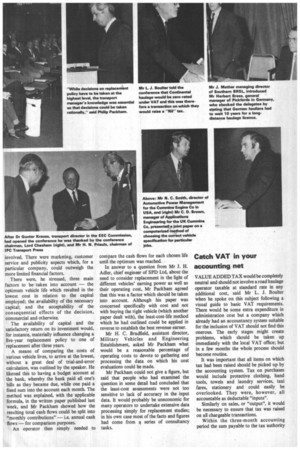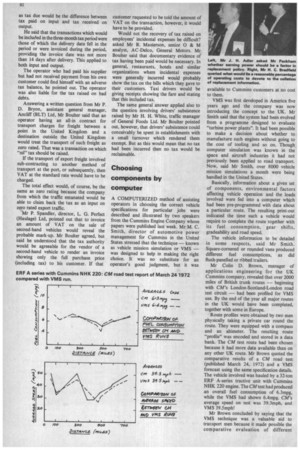Catch VAT in your accounting net
Page 83

Page 84

If you've noticed an error in this article please click here to report it so we can fix it.
VALUE ADDED TAX would be completely neutral and should not involve a road haulage operator taxable at standard rate in any additional cost, said Mr L. J. Boulter when he spoke on this subject following a visual guide to basic VAT requirements. There would be some extra expenditure in administration cost but a company which already had an accountancy system suitable for the inclusion of VAT should not find this onerous. The early stages might create problems, which should be taken up immediately with the local VAT office; but in a few months the whole process should become routine.
It was important that all items on which tax had been raised should be picked up by the accounting system. Tax on purchases would include protective clothing, hand tools, towels and laundry services, taxi fares, stationery and could easily be overlooked. They were, however, all accountable as deductable "inputs".
Similarly on sales, or "output", it would be necessary to ensure that tax was raised on all chargeable transactions.
Within the three-month accounting period the sum payable to the tax authority
as tax due would be the difference between tax paid on input and tax received on output.
He said that the transactions which would be included in the three-month tax period were those of which the delivery date fell in the period or were invoiced during the period, providing the invoice date was not more than 14 days after delivery. This applied to both input and output.
The operator who had paid his supplier but had not received payment from his own customer could find himself with an adverse tax balance, he pointed out. The operator was also liable for the tax raised on bad debts.
Answering a written question from Mr P. D. Bryon, assistant general manager, Ancliff (BLT) Ltd, Mr Boulter said that an operator having an all-in contract for transport charges for freight between a point in the United Kingdom and a destination outside the United Kingdom would treat the transport of such freight as zero rated. That was a transaction on which "nil" tax should be raised.
If the transport of export freight involved sub-contracting to another method of transport at the port, or subsequently, then VAT at the standard rate would have to be charged.
The total effect would, of course, be the same as zero rating because the company from which the traffic emanated would be able to claim back the tax as an input on zero rated export traffic.
Mr P. Spandler, director, L. G. Perfect (Haulage) Ltd. pointed out that to invoice an amount of VAT on the sale of second-hand vehicles would reveal the probable mark-up. Mr Boulter agreed, but said he understood that the tax authority would be agreeable for the vendor of a second-hand vehicle to render an invoice showing only the full purchase price (including tax) to his customer. If that customer requested to be told the amount of VAT on the transaction, however, it would have to be provided.
Would not the recovery of tax raised on employees' incidental expenses be difficult? asked Mr B. Masterson. senior 0 & M analyst. AC-Delco, General Motors. Mr Boulter said that documentary evidence of tax having been paid would be necessary. In general, restaurants, hotels and similar organizations where incidental expenses were generally incurred would probably show the tax on the bills which they gave to their customers. Taxi drivers would be giving receipts showing the fare and stating that this included tax.
The same general answer applied also to the question involving drivers' subsistence raised by Mr H. H. White, traffic manager of General Foods Ltd. Mr Boulter pointed out, however, that drivers' subsistence could conceivably be spent in establishments with a small turnover which rendered them exempt. But as this would mean that no tax had been incurred then no tax would be reclaimable.








































































































































































































































